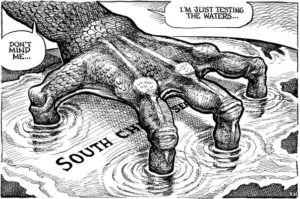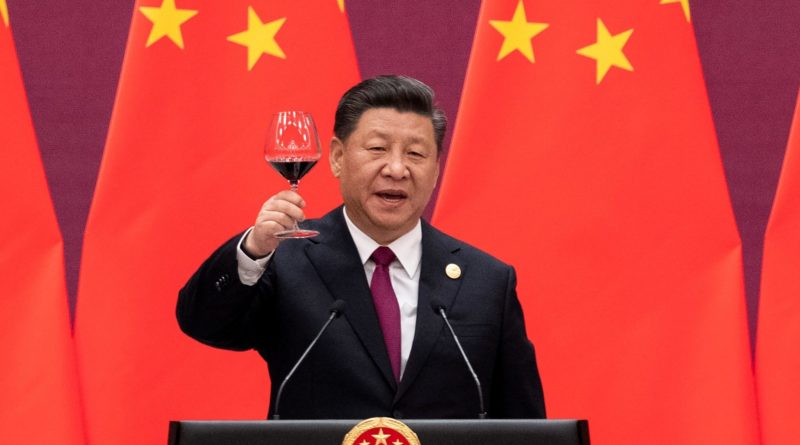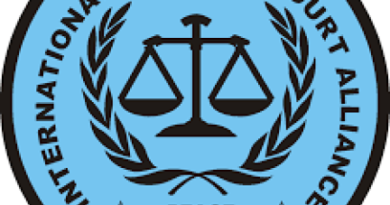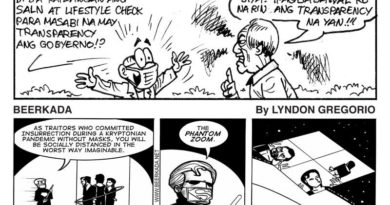WORLD-ASIA | BEIJING – China’s Xi Jinping takes on unprecedented third term as president

..

BEIJING – China’s Parliament on Friday voted unanimously for Mr Xi Jinping to assume an unprecedented third five-year term as state president, capping his rise to become the most powerful leader since Chairman Mao Zedong.
All delegates also elected him as chairman of the state Central Military Commission (CMC) that oversees the People’s Liberation Army, and endorsed his choice of outgoing Executive Vice-Premier Han Zheng as vice-president, succeeding Mr Wang Qishan.
After his third term as president was announced, there was sustained applause for close to a minute. Mr Xi bowed to the audience and shook hands with Mr Li Zhanshu, the outgoing parliamentary chairman, and Mr Li Qiang, who is ranked second in the Communist Party of China’s (CPC) hierarchy and is the front runner to be premier.
Following the announcements, goose-stepping soldiers ceremoniously brought in a copy of the Chinese Constitution, on which the newly elected officials made a pledge of allegiance.
With his left hand on the Constitution and his right fist raised, Mr Xi vowed to build a prosperous and strong “modern socialist country” and to be loyal to the motherland and the people.
His third term as president comes as the world’s second-largest economy faces economic challenges after emerging from a Covid-19 slump. The economy grew just 3 per cent in 2022 against a target of 5.5 per cent, among its worst performances in decades. During the parliamentary session, the government set a modest growth target of around 5 per cent.
On the diplomatic front, China is juggling increasingly tense relations with the United States and its allies over issues such as trade, Taiwan, Beijing’s backing of Russia and human rights.
The National People’s Congress (NPC), or Parliament, had amended the Constitution in 2018 to scrap a two-term limit on the presidency.
Singapore’s President Halimah Yacob and Prime Minister Lee Hsien Loong both wrote letters on Friday congratulating Mr Xi on his reappointment as president.
Mr Xi was the lone candidate in the two elections, where all 2,952 delegates voted for him. Mr Han also faced no challengers.
In China, the identities of candidates up for official posts are not publicly known until election day. But a harbinger of things to come may have been when Mr Han entered the Great Hall of the People in Beijing ahead of Mr Wang at the opening of Parliament on Sunday.
The presidency and vice-presidency are prestigious posts, but largely ceremonial. Real power lies in the hands of the general secretary of the CPC and the CMC chairman. Mr Xi was re-elected as general secretary in October 2022.
Mr Han turns 69 in April, and is a year younger than Mr Xi. In the event that Mr Xi is incapacitated or dies in office, Mr Han would assume the presidency.
Political observers believe that Mr Han, who became the youngest mayor of Shanghai in 2003 at the age of 48, was given the vice-presidency ostensibly to placate the Shanghai Gang faction that ruled China for more than a decade. This faction in the CPC was headed by the late president Jiang Zemin, who had handpicked Mr Xi as his heir apparent in 2007.
Mr Wang was given the vice-presidency in 2018 as a reward for the instrumental role he played in Mr Xi’s crackdown on official corruption from 2012 to 2017.
Mr Han and Mr Wang stepped down from the CPC’s Politburo Standing Committee (PSC) – the pinnacle of power in China – in October 2022 and 2017, respectively, after reaching the retirement age of 68.
On Friday, Mr Zhao Leji, 66, ranked third in the party’s standing committee, was elected chairman of Parliament by all delegates, taking over from Mr Li Zhanshu. The role involves presiding over lawmaking sessions.
The usually stern Mr Zhao broke into a rare smile when he shook hands with Mr Xi after bowing to the audience. He continued smiling when shaking hands with his predecessor.
Earlier in the day, the NPC approved a plan to restructure the Cabinet and cut the number of civil servants at the central government level by 5 per cent over the next five years.
A financial regulatory administration will also be formed, bringing supervision of the finance industry directly under the State Council, or China’s Cabinet. The Ministry of Science and Technology has also been restructured as China places more emphasis on the sector in a bid to outcompete its tech rivals.
This is a precursor to more party reforms that are expected, further eroding the “parallel tracks” of the party and the state that have been a feature of the Chinese government for nearly 40 years, said Associate Professor Alfred Wu of the Lee Kuan Yew School of Public Policy.
“A lot of what we are seeing, the personnel choices and the structural changes at the (parliamentary meetings) this year, are the implementation and continuation of decisions that were made during the 20th Party Congress last year,” he told The Straits Times.
Following the twice-in-a-decade meeting, Mr Xi was elected as general secretary of the CPC for a rare third term, and stacked the PSC with his supporters, including Mr Li Qiang, who is all but certain to be confirmed as premier at a vote this weekend.
Historically, the government separated party and state to boost government efficiency and capability, said Assistant Professor Lee Jonghyuk of the S. Rajaratnam School of International Studies.
“The potential pitfalls (of blurring the lines) include the erosion of professionalism in government organisations,” he said.
“(It) also prevents entrepreneurship, creativity and autonomy of the government organisations – which sometimes should implement policies beyond the roles of traditional bureaucracy.”


 Memento Maxima Digital Marketing
Memento Maxima Digital Marketing Ads by: Memento Maxima Digital Marketing
Ads by: Memento Maxima Digital Marketing






